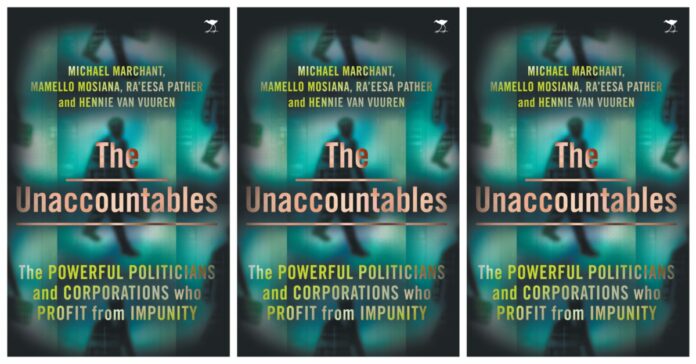“We have not forgotten” is the tagline for the Open Secrets investigation series The Unaccountables. The series has just been turned into a book. Open Secrets is a civil society organisation that was established in 2017. Since then, the organisation has been investigating all kinds of economic crimes and human rights abuses. The book is edited by Michael Marchant, Mamello Mosiana, Ra’eesa Pather and Hennie van Vuuren. Their book profiles the unaccountable large corporations and private individuals who have been implicated in economic crime.
The book started from a series published in the Daily Maverick. The series consisted of profiles of large corporations and private individuals. The Daily Vox team spoke to Mamello Mosiana and Ra’eesa Pather about turning the series into a book and more.
Mosiana said the thing with the series is that the parts were all stand-alone. What Open Secrets wanted to do was put together a campaign of all the work they had done. Mosiana said a book allowed them to better illustrate the pattern of behaviour of the powerful. In this way, they were able to show a comprehensive history from apartheid to the arm deals to state capture and the current battles for accountability.
RELATED:
People’s Hearing To Look At Human Impact Of State Capture
Pather added that sometimes by reading the profiles on their own, the context or the bigger picture is lost. By compiling all their investigations in one place, it allows the bigger picture to emerge. Putting it in a book form was also about accessibility for people. Mosiana mentioned that with data being so expensive, the Unaccountables series was not accessible to everyone on the internet. However, books could be read at libraries and were slightly more accessible.
One of the main messages of the book is of course showcasing how so many individuals and corporations have largely remained unaccountable over the years. It focuses on the lack of accountability and the impunity that these individuals and corporations have enjoyed. Yet another message the book aims to bring light to is that the situation is not hopeless.
RELATED:
European Banks Called To Answer For Apartheid Crimes
Through their work and the book, Open Secrets wants to contribute to a culture of accountability and action against those implicated. In every chapter of the book where they outline the 35 different “Unaccountables”, they also identify different actions to make accountability possible.
Pather said the book shows that there are already structures and mechanisms in place to hold private sector actors to accounts. The issue is that the institutions which have been somewhat eroded are also not using these mechanisms effectively. Pather said part of what they want to achieve with the book is calling on institutions to become stronger so that they can do their jobs more effectively. This includes institutions like the National Prosecuting Authority (NPA), and regulatory bodies for lawyers, banks, auditors and so on.
Pather said it is possible to hold people to account because the mechanisms do exist. They are just working the way they are supposed to.
Mosiana said: “What we’re trying to demonstrate is that it is possible to hold people accountable and to fight unaccountability in our society. We just need to make the systems that are already there are more rigorous.”
RELATED:
How Economic Crimes Occur In South Africa
Another thing that the book amplifies is corruption and economic crimes are not only a South African problem. The crimes rely on a global network of actors. Mosiana said that the investigations and chapters in the book show “how corruption in South Africa really takes a global network of players including banks, accountants and lawyers”. It is important to understand what is happening in the global sector, said Mosiana. The reason being that without understanding that it doesn’t make sense why these actors have gained the amount of power they have and the amount of influence they have.
This could on the other hand make the problem seem even bigger and more difficult to tackle. But Pather said she hopes that when people read the book they realise that corporates are not too big to fail or too big to hold accountable.
“Essentially what we as South Africans and people around the world who are victims of economic crime – what we are left with is rolling blackouts and increased poverty and austerity measures and more inequality. And we kind of just accept that this is the norm.” said Pather.
This book wants to show that justice is possible. It is also a sign that the work is not done. The book consists of 35 individual stories grouped into eight sections. It is just a tiny peek into the many more individuals and corporations out there who are implicated in economic crimes. In the book, there is a strong message: “Our advice: do not be impatient if your infamy is not sufficiently recognised, rather be assured you are on the list of future investigations.”
Mosiana emphasised that during the interview – that Open Secrets and all their partners are done yet.
“I think no one should rest if they have been excluded from this book. We are still coming for them,” Mosiana said. She said a lot of the work in the book is ongoing and they are only going to “intensify it in fighting for accountability”.
More information on Open Secrets work can be found here









